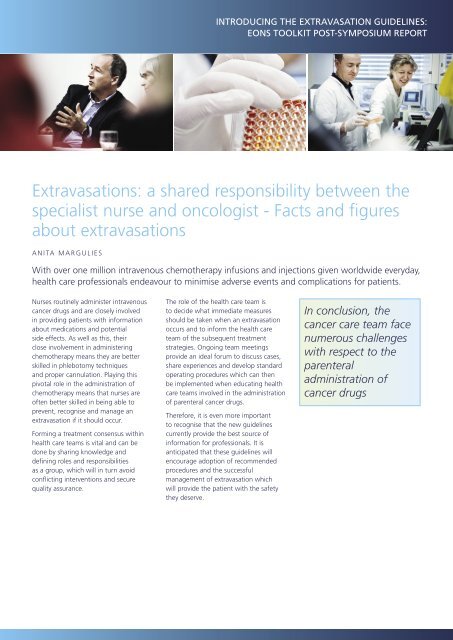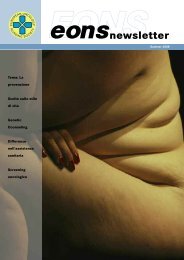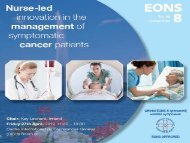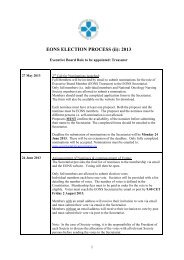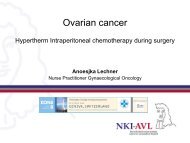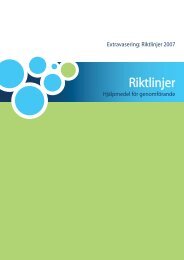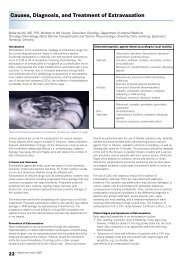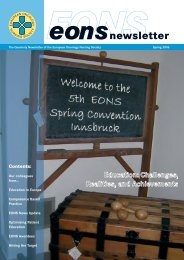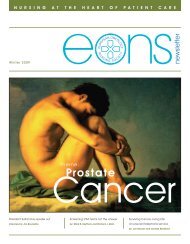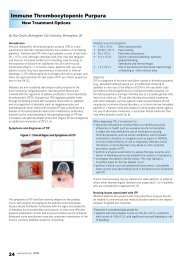Introducing the Extravasation Guidelines - the European Oncology ...
Introducing the Extravasation Guidelines - the European Oncology ...
Introducing the Extravasation Guidelines - the European Oncology ...
Create successful ePaper yourself
Turn your PDF publications into a flip-book with our unique Google optimized e-Paper software.
INTRODUCING THE EXTRAVASATION GUIDELINES:<br />
EONS TOOLKIT POST-SYMPOSIUM REPORT<br />
<strong>Extravasation</strong>s: a shared responsibility between <strong>the</strong><br />
specialist nurse and oncologist - Facts and figures<br />
about extravasations<br />
A N I TA M A RGULIES<br />
With over one million intravenous chemo<strong>the</strong>rapy infusions and injections given worldwide everyday,<br />
health care professionals endeavour to minimise adverse events and complications for patients.<br />
Nurses routinely administer intravenous<br />
cancer drugs and are closely involved<br />
in providing patients with information<br />
about medications and potential<br />
side effects. As well as this, <strong>the</strong>ir<br />
close involvement in administering<br />
chemo<strong>the</strong>rapy means <strong>the</strong>y are better<br />
skilled in phlebotomy techniques<br />
and proper cannulation. Playing this<br />
pivotal role in <strong>the</strong> administration of<br />
chemo<strong>the</strong>rapy means that nurses are<br />
often better skilled in being able to<br />
prevent, recognise and manage an<br />
extravasation if it should occur.<br />
Forming a treatment consensus within<br />
health care teams is vital and can be<br />
done by sharing knowledge and<br />
defining roles and responsibilities<br />
as a group, which will in turn avoid<br />
conflicting interventions and secure<br />
quality assurance.<br />
The role of <strong>the</strong> health care team is<br />
to decide what immediate measures<br />
should be taken when an extravasation<br />
occurs and to inform <strong>the</strong> health care<br />
team of <strong>the</strong> subsequent treatment<br />
strategies. Ongoing team meetings<br />
provide an ideal forum to discuss cases,<br />
share experiences and develop standard<br />
operating procedures which can <strong>the</strong>n<br />
be implemented when educating health<br />
care teams involved in <strong>the</strong> administration<br />
of parenteral cancer drugs.<br />
Therefore, it is even more important<br />
to recognise that <strong>the</strong> new guidelines<br />
currently provide <strong>the</strong> best source of<br />
information for professionals. It is<br />
anticipated that <strong>the</strong>se guidelines will<br />
encourage adoption of recommended<br />
procedures and <strong>the</strong> successful<br />
management of extravasation which<br />
will provide <strong>the</strong> patient with <strong>the</strong> safety<br />
<strong>the</strong>y deserve.<br />
In conclusion, <strong>the</strong><br />
cancer care team face<br />
numerous challenges<br />
with respect to <strong>the</strong><br />
parenteral<br />
administration of<br />
cancer drugs


